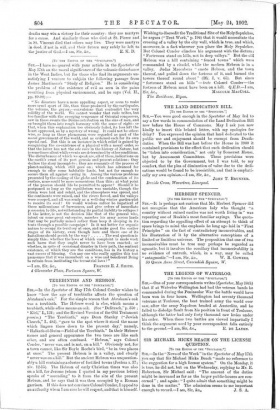[TO THE EDITOR OF THE "SPECTATOR:"]
SIR,—I have no quarrel with your article in the Spectator of May 17th on the moral significance of the volcanic disturbance in the West Indies, but for those who find its arguments un- satisfying I venture to subjoin the following passage from James Martineau's "Study of Religion." He is considering the problem of the existence of evil as seen in the pains resulting from physical environment, and he says (Vol. II.,
pp. 89-90) :—
"No disasters have a more appalling aspect, or seem to make more cruel sport of life, than those produced by the earthquake, the volcano, the geyser,—convulsions that contradict the very solidity of the world. We cannot wonder that rude tribes, but too familiar with the sweeping vengeance of Oriental conquerors, saw in these events the Divine retribution on the sins of men, and so brought them into rough harmony with the sense of right : or that, when this explanation too obviously failed, its loss left the heart oppressed, as by a mystery of wrong. It could not be other- wise, so long as these phenomena were regarded as part of the moral government of the world, and as ordained each for its own special end. But this is an instance in which relief is gained by recognising the co-existence of a physical with a moral order, so that the latter has not the sole voice in the history of Nature, but is sometimes silent while events are determined by other conditions. The disturbances of which we speak are, all of them, indications on the earth's crust of its past genesis and present relations : they declare the story incomplete ; they are remnants of the process of planet-making, which still goes on ; which has advanced far enough to offer some habitable lands, but not far enough to secure them all against caving in. Among the various problems presented by the cooling of the globe and the condensation of its surface, none could be more momentous than this : at what point of the process should life be permitted to appear ? Should it be postponed so long as the equilibrium was unstable, though the strata were laid and relaid, and the atmosphere was spread, and the continents were raised, and the rivers flowed, and the valleys were scooped, and all was ready as a well-dug winter garden-plot to receive its seed ? Or would wisdom rather be impatient of these millenniums of barrenness, and give orders of immediate possession to life, notwithstanding its partial liability to collapse ? If the latter, is not the decision like that of the general who, intent on some great enterprise, marches his army across lands that may be partially mined rather than keep it sleeping in its tents through a possible campaign ? Is it not better for organic nature to occupy its territory at once, and make good the earlier stages of its history, even though here and there one of its
battalions should perish by the way ? The real question is simply this : whether the laws 0 which complaint is made work such harm that they ought never to have been enacted ; or whether, in spite of occasional disaster in their path, the sentient existence, of which they are the conditions, has in its history a vast excess of blessing. Can any one who really applies this test pronounce that it was incumbent on a wise and beneficent Being to refrain from instituting the terrestrial laws ?"
Gloucester Place, Portman Square, W.






































 Previous page
Previous page